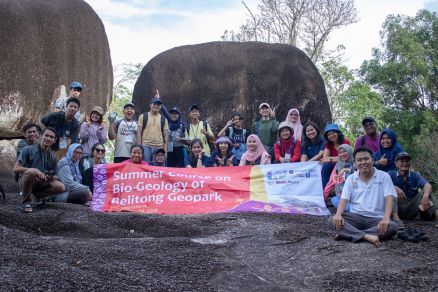Students from 7 Countries Learn The Biodiversity of Belitong Park during IPB University Summer Course

Undergraduate and graduate students from seven countries; Japan, Thailand, United Kingdom, Malaysia, Australia and Indonesia, took part in the Summer Course held by the Department of Biology, Faculty of Mathematics and Natural Sciences (FMIPA) in collaboration with MCSTO IPB University, Belitong Geopark, Belitung Regency Government, and Nottingham University, last October.
These Summer Course students came from Osaka University-Japan, Kasetsart University-Thailand, Nottingham University-UK, Universiti Putra Malaya-Malaysia, Western Sydney University-Australia, and IPB University-Indonesia. This activity was also participated by 10 students of SMA Negeri 1 Tanjungpandan, Belitung.
“This activity aims to introduce the biodiversity of Belitung and all its potential including tourism attractions. Every day, students were invited to study in one Geo-site. On the first day, participants explored the diversity of Semar Pouch in the Kerangas Cendil Forest area and the Klapa Kampit open pit, which was guided by Dr. Triadiati from the Division of Plant Physiology and Genetics, Department of Biology, FMIPA IPB University and Dr. Yulian Fakhrurrozi from Belitong Geopark,” said the Head of Biology Department, Dr. Miftahudin.
Besides that, Dr Rika Raffiudin, an IPB University lecturer as well as expert on stingless bees, also guided the students to study bees cultivation technique in Tanjung Kelayang Beach. Not only observing the bees’ behaviour and beehives, students could also taste the honey directly from the beehive.
Dr. Puji Rianti, IPB University lecturer from the Division of Animal Physiology and Behaviour also taught about sustainable tourism and animal biodiversity. In this area, participants explored terrestrial and aquatic animals along the journey to the hills. In the evening, participants were also invited to see first-hand the world’s smallest primate, Tarsius, directly in their natural habitat.
After exploring the hills, Dr. Laura Dean from Department of Life Sciences, Nottingham University-UK, guided the participants for aquatic organism sampling in the Batu Bedil Beach. The discovered organisms were molluscs, insects, butterflies, birds, benthic invertebrates, and spiders.
“This activity is very important for Belitung biodiversity education, both for participants and local people to be more aware of the nature. This activity can also be an initiation of cooperation between Nottingham University and the Belitung Regency Government,” she said. (Zul)



